Multi Commodity Exchange of India Ltd. (MCX) IPO Highlights:
So, what’s the subscription offer? Here’s the review of the MCX IPO…
Multi Commodity Exchange of India Ltd., the leading commodity exchange of India is coming up with its IPO of 67,27,378 shares of Rs. 10 each. The IPO price band has been fixed at Rs. 860/- to Rs. 1032/- per equity share. The offer opens on February 22th and closes on February 24th, 2012. Investors can subscribe to the IPO in market lot of 6 shares and multiples thereof.
Tell me more about MCX…
Incorporated in 2003, Multi Commodity Exchange of India Ltd (MCX) is a market leading electronic commodity futures exchange. It is a de-mutualised exchange and has received permanent recognition from the Government of India on 26 September 2003, to facilitate nationwide online trading, clearing and settlement operations of commodities futures transactions.
There are five officially recognized electronic multi-commodity national exchanges in India – MCX, NCDEX, NMCE, ICEX and ACE. These five national multi-commodity exchanges accounted for 99.5% of the turnover of commodity futures contracts traded in India. MCX is the largest among these and has above 80% of the market share of the Indian commodity futures exchange industry.
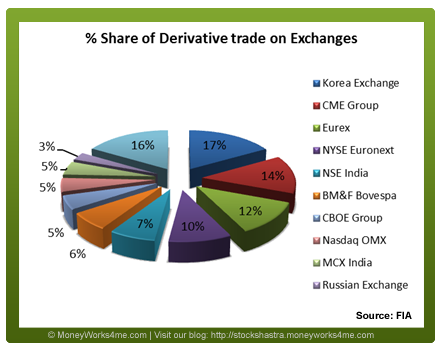
As on date, MCX offers trading in 53 contracts across sectors like bullion, metals, energy, weather and agricultural products. The Exchange is the world’s largest in Silver, the second largest in Gold, Copper and Natural Gas, and the third largest in Crude Oil futures in terms of number of futures contracts traded.
Who are the people/investors behind MCX?
Financial Technologies (FTIL), the promoter group of MCX, owns 31.18% of its equity capital. Jignesh P. Shah, Vice Chairman and Non-Executive Non-Independent Director, is a first generation entrepreneur and the founder/promoter of the Financial Technologies group of companies. Prior to establishing FTIL, he was with the BSE, where he was responsible for designing and implementing the technology platform of the exchange.
Other large shareholders of MCX include financial institutions and other entities from the financial sector, such as State Bank of India, FID Funds (Mauritius) Limited (an affiliate of Fidelity International), Euronext N.V. (an affiliate of NYSE Euronext) and Merrill Lynch Holdings (Mauritius).
Use of IPO Proceeds…
This IPO is an offer for sale of equity shares by investors (and not promoters) holding in MCX. This will help improve liquidity and valuation for MCX. It will also help in determining the fair value of the company, which may help in raising equity in future at better prices. However, the company won’t get any share of the proceeds raised in the IPO. The table below lists the companies and the number of shares on offer for investors. Also indicated is the capital gains each company would make on its initial investment.
The table below indicates institutions not selling their stake in IPO
There are five officially recognized electronic multi-commodity national exchanges in India – MCX, NCDEX, NMCE, ICEX and ACE. These five national multi-commodity exchanges accounted for 99.5% of the turnover of commodity futures contracts traded in India. MCX is the largest among these and has above 80% of the market share of the Indian commodity futures exchange industry.
What sets the company apart? Here is the analysis of MCX
1. MCX’s Financial track record
From humble beginnings, MCX has grown to be a behemoth in Indian commodity derivatives trading business. The company has doubled its sales in last four years and has grown at 33.8% five year CAGR. The EBITDA margins have been close to 60%. On the bottomline front, the company has grown its EPS by 30.04% 5 year CAGR. The EPS growth has been muted due to high fixed costs involved in the early stage and due to profit received from sale on investments in a few of the prior years. The company also enjoys a high RoE of >60% and a negative working capital cycle. Considering all this, we can be relatively confident on the financials of the company.
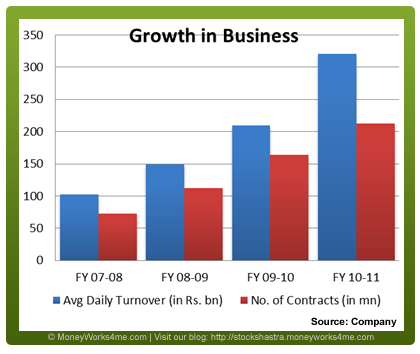
2. MCX Leadership position in commodity trading in India
MCX is India’s largest and the world’s 5th largest commodity derivatives exchange. It is also the 9th largest derivatives exchange in the world in terms of volumes traded. It has ~5% share of world’s derivatives trading market. This has enabled the company to benefit from long term opportunities. During FY 07-11, value traded on the exchange grew at a scorching pace of ~45% CAGR.
Increased speculation in bullion & metals space, high prices of commodities and increased volatility has led to an increased demand for hedging and higher speculation. MCX has a diversified product suite that is relevant not only to the Indian market but also caters to the global audience. Growing importance of emerging markets has also led to greater investor participation. MCX has also benefitted from increasing participation from the retail segment.
3. Exchange-listed futures are non-fungible
The term ‘Non-fungible’ means that the contracts created by MCX are traded and cleared solely by MCX. The lack of transferability provides it with a high level of volume and price protection. This makes the business model more stable and supports top-line growth. Furthermore MCX’s leadership position in commodities (especially in base metals, energy and bullion) futures in India gives it an inherent edge. One can verify this by looking at examples of new exchanges like ICEX by Indiabulls and Ace commodity exchange by Kotak which have failed to pose a strong challenge to MCX. Even older ones like NCDEX have been unable to capture market share from MCX, especially in metals, bullion and energy futures where MCX is the undisputed leader.
4. Business Model is scalable
The business model of MCX is highly scalable and has the potential to generate better margins at greater volumes. MCX has made significant investments in developing operating infrastructure, including technology systems, to support anticipated growth and increase in the demand for products. The current technology infrastructure is sufficient to handle daily trading volumes of up to 1,00,00,000 trades a day, much higher than the current requirement. Given the high fixed cost and low variable cost structure of MCX, increase in volumes traded translates to increased EBIT margins. Global exchanges like CME & ICE, operate at ~60% operating margins, MCX enjoys EBIT margin of 50% (FY10). One can expect margins to improve as trading activity increases on the exchange. Thus the overall business model is highly scalable and offers potential for economic growth of MCX’s business with limited incremental costs.
5. Increased room for dividends in future due to unique business model
Global exchanges are high annuity, low Capex and high dividend yielding companies. Global exchanges pay as high as 70-80% dividend. MCX, historically, has paid an average dividend of 25%. Thus going forward the company will likely have a higher dividend pay-out ratio. This is just an expectation, looking at what its global peers have paid out. Whether the company actually pays out such high dividends is something that remains for the future.
6. Growing market presence and participants
As on 31 December, 2011, MCX had 2,153 members nationwide with more than 2,96,000 terminals spread over 1,572 cities and towns in India. Management has indicated that it intends to continue to increase the number of participants by introducing newer products on the Exchange, by expanding to more geographical areas and by efforts to disseminate knowledge and information about the commodity futures industry. Going forward, the Management plans to establish and grow presence in additional regions across India.
But what are the concerns?
1. Negative regulations may impact MCX
Media reports suggest that government may be contemplating imposing Commodity Transaction Tax in the current budget. When Securities Transaction Tax (STT) was imposed on trading in equities, the equity market volumes declined by more than 20%. It has been observed that day traders moved to commodity trading after the STT was levied on trading in equities. So any such move may be negative for the company.
2. MCX is exposed to a fall in prices of commodities
If one were to look at historical volume and value traded data on MCX, one finds that much of the growth in the value traded has come from increase in gold and silver prices rather than increase in the volumes traded in the exchange. Hence the growth prospects of the company may be negatively impacted in case prices of gold/silver price fall.
3. Aggressive investments by promoter group can be an overhang
The promoter group of MCX, Financial Technologies (FTIL) has been very aggressive in expanding its business by investing and promoting new exchanges across the world. This has led to FTIL reporting losses in past few years. As the business is a high fixed cost, low variable/incremental cost business, this leaves the promoters open to business risks in future. Any detrimental effect on promoters may harm MCX in the future.
SWOT Analysis of MCX
So, should you invest in the MCX IPO?
According to MoneyWorks4me analysis, at the IPO price band of Rs. 890 -Rs. 1032, MCX would be trading at a FY12 (annualised) P/E ratio band of 15.6x to 18.8x. If one assumes a conservative EPS growth rate of 25% for FY13, it would be trading at P/E of 14.7x implying a significant discount (10-15% at the average P/E band of 16.5-17.0) to global peers despite strong growth potential for the future.
The IPO price range is therefore at a significant discount to its global peers ICE and CME despite having strong growth prospects. MCX also provides EBITDA margins of >60%, RoE of >60%, a negative working capital and a debt free balance sheet.
Considering the excellent future growth prospects and the attractive valuation, we advise retail investors to consider subscribing to the issue from a long term perspective.
Want to find many other Fundamentally sound stocks and their Right Prices along with incisive Analysis?
Subscribe Now!
Disclaimer: This publication has been prepared solely for information purpose and does not constitute a solicitation to any person to buy or sell a security. It does not constitute a personal recommendation or take into account the particular investment objectives, financial situations or needs of an individual client or a corporate/s or any entity/ies. The person should use his/her own judgment while taking investment decisions.
If you liked what you read and would like to put it in to practice Register at MoneyWorks4me.com. You will get amazing FREE features that will enable you to invest in Stocks and Mutual Funds the right way.
Need help on Investing? And more….Puchho Befikar
Kyunki yeh paise ka mamala hai
Start Chat | Request a Callback | Call 020 6725 8333 | WhatsApp 8055769463


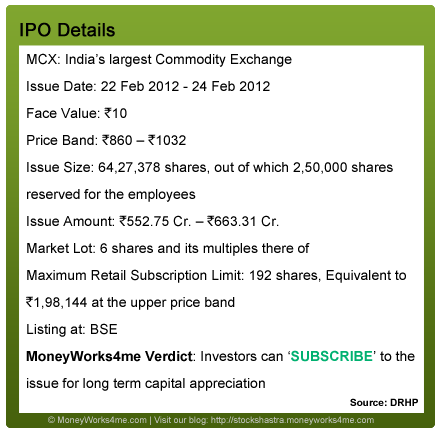
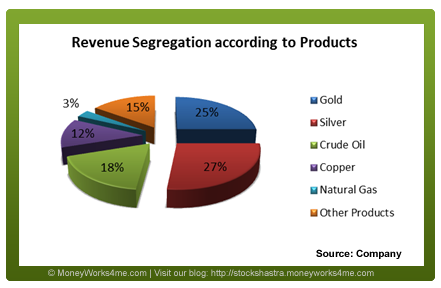

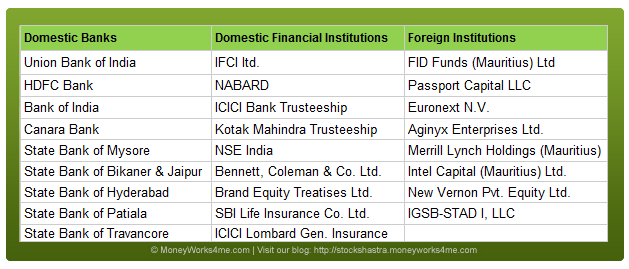










thanks for the informative analysis
will this ipo come under finance industry as per your classification